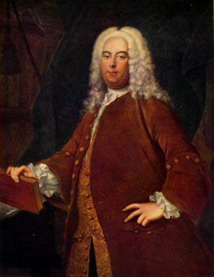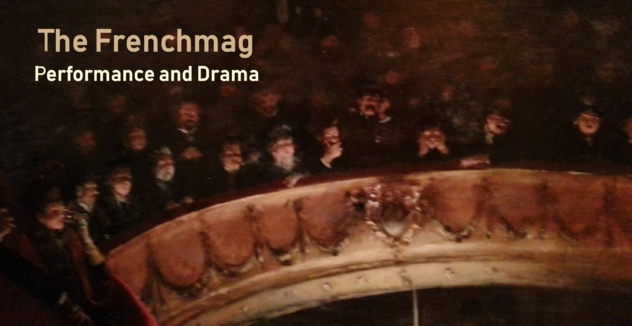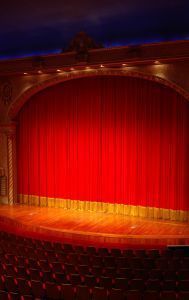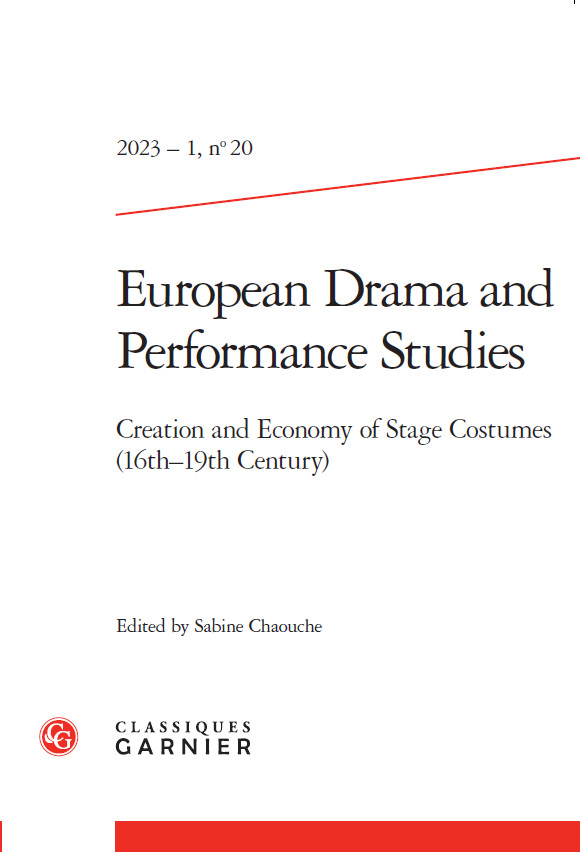
Georg Friedrich Händel, by Thomas Hudson / Wikicommons
Le but de ce colloque international sera en conséquence d'envisager la « résonance », l'influence et la renommée durable de la figure et de l'oeuvre de Haendel à la fois de son vivant et au-delà, dans une perspective diachronique et pluridisciplinaire.
Tout au long du XVIIIe siècle, George Frederick Haendel fut la figure musicale majeure en Angleterre. Bien qu’allemand d’origine, Haendel devint bientôt le « compositeur national » officiel. Sa domination inébranlable sur la scène musicale anglaise de l’époque avait de nombreuses facettes : tandis qu’elle peut s’expliquer par le soutien dont il jouissait de la part des élites de la nation tout comme par son habileté commerciale manifeste et le succès qui en résultait, cette domination aboutit à faire de sa manière la référence stylistique absolue à laquelle les autres compositeurs anglais devaient aussi bien se mesurer que se plier.
Sa contribution majeure à la fois comme compositeur d’opéras italiens que comme « fondateur » de l’oratorio anglais, associé à l’image symbolique de l’orgue et à ses prouesses en tant qu’interprète et improvisateur au clavier, fit de lui le prototype du « génie naturel » préromantique. Après son décès, son premier biographe, John Mainwaring (Memoirs of the Life of the Late G.F.Handel, 1760) contribua grandement à la création de cette image qui devait déboucher sur un véritable culte de la figure et de l’œuvre du compositeur.
Un très grand nombre de publications – livres, articles, poèmes – furent consacrés à Haendel aussi bien de son vivant qu’après sa mort. La vaste Commémoration de Haendel organisée à l’abbaye de Westminster et au Panthéon à Londres en 1784 et suivie de manifestations similaires les années suivantes, présentait Haendel comme l’incarnation même du caractère national en utilisant son œuvre et son image à des fins de propagande idéologique et patriotique pour célébrer la grandeur de la nation britannique.
Les nombreux festivals organisés en province au cours du XVIIIe siècle, tout comme les grandes manifestations musicales et patriotiques mises en scène dans les immenses édifices municipaux construits au XIXe siècle témoignent du fait que l’influence de Haendel devait durer bien au-delà de sa propre disparition et même après que sa propre musique fut devenue stylistiquement démodée et qu’on eut cessé d’interpréter ses œuvres sous leur forme originelle.
Throughout the 18th century, George Frederick Handel was the dominant musical figure in England. Although born in Germany, Handel soon became the official 'national composer.' His unflinching domination over the English musical scene of the period was multifaceted: while it can be explained in terms of the support granted him by the nation’s elite as well as by his obvious commercial astuteness and consequent success, it eventually led to his style becoming the absolute reference other English composers had both to emulate and to measure up to. His contribution as both a major Italian opera composer and then the 'founding father' of the English oratorio, associated as it was with the symbolic image of the organ and his own performance as a dazzling keyboard player and improviser, made of him the prototype of the pre-romantic 'natural genius.'
After his death, his first biographer, John Mainwaring (Memoirs of the Life of the Late G.F.Handel, 1760) contributed greatly to the fashioning of that image, which led to a lasting cult of the composer’s figure and works. A large body of publications – books, articles, poems – was devoted to Handel both in his lifetime and for decades after his death. The Great Handel Commemoration organised at Westminster Abbey and the Pantheon of 1784, and followed by similar events in the following years, presented Handel as the very embodiment of the national character and used his work and image in an ideological patriotic construct to celebrate the greatness of the British nation. The music festivals organised in the provinces in the 18th century as well as the great musical and patriotic celebrations staged in the newly-built Town-Halls in the 19th century testified to the fact that the influence of Handel lasted well beyond his own demise and even after his own music had become stylistically old-fashioned and his works had ceased being performed in their original form.
The aim of the conference is consequently to envisage the 'resonance,' influence and lasting fame of the figure and work of Handel both during his lifetime and beyond, in a diachronic and interdisciplinary perspective.
Programme
Jeudi 18 octobre
Myth and Reality: the Construction of the Icon
Président de séance : Michael Burden
9h00 Pierre Dubois (ICD, Université de Tours)
From Myth to Reality: the Rewriting of Handelian Historiography from Mainwaring until Today.
9h45 Annette Landgraf (Redaktion der Hallischen-Händel-Ausgabe)
The German Belletristic Literature about George Friedrich Handel – Fact and Fancy.
Pause
10h45 Matthew Gardner (Ruprecht-Karls-Universität, Heidelberg)
The Great Mr Handel (1942): Handel’s first Biopic, its Sources and Wartime Allegory.
11h30 Brian Robins (Independent Scholar), keynote speaker
Handel and John Marsh
Déjeuner
Crossing the Desert, or Keeping the Flame Alive?
Présidente de séance : Laurine Quetin
14h Pierre Degott (Université de Lorraine)
‘Expansive and penetrating straight to the heart’ : le répertoire lyrique haendélien entre 1754 et 1920.
14h45. Lionel Duguet (Laboratoire de Recherche Arts Spectacle Musique, Université d’Evry - Val d’Essonne)
Réception du Messie de Haendel en France au XIXe siècle.
15h30 Gilles Couderc (ERIBIA, Université de Caen)
‘Move over, Handel’: The English Musical Renaissance (1840-1940) and its Quest for New Musical Heroes.
Pause
16h15 Adrian La Salvia (Ruhr-Universität Bochum)
La renaissance de Haendel au miroir des traductions.
17h Michael Burden (New College, Oxford)
When Giulio Cesare was not ‘Handel’s’ Giulio Cesare: the Opera on the London Stage in 1787.
17h45 Françoise Deconinck-Brossard (Université Paris Ouest Nanterre La Défense)
Sharp, Haendel et les autres.
Vendredi 19 octobre
Adaptation and Betrayal: Handel as a Source of Inspiration
Président de séance : Pierre Degott
9h00 Steven Young (Bridgewater State University)
Handel Redux: Late Romantic Organ Composers and the Handelian Legacy.
9h45 Jean-Philippe Heberlé (Université de Lorraine)
L’héritage haendélien et Michael Tippett : George Frederick Haendel comme modèle et contre-modèle.
Pause
10h45 Yaiza Bermúdez Cubas (Conservatorio Superior de Música de Badajoz, “Bonifacio Gil”)
Reflections of Handel’s Music in Film: Classical Music or Popular Music?
11h30 Donald Burrows (Open University), keynote speaker
Turning the Handel - how Handel's music survived 250 years
Déjeuner
Interpreting Handel Today (1): Gender Issues
Président de séance : Pierre Dubois
14h Ivan Ćurković (University of Zagreb / Heidelberg University) Men and/or Women: Gender Ambiguity and Performance Practice in DVD Recordings of G. F. Handel’s Operas and Oratorios.
14h45 Maja Vukušić Zorica (Université de Zagreb)
Les pérégrinations du genre – ‘Bent that bends’ : des castrats aux contre-ténors, et des haute-contre aux drag ?
15h30 Jacques Coulardeau (Université Paris 8 Vincennes Saint Denis)
Agrippina by Handel: Two Modern Interpretations and the Role of Male Altos.
Pause
Interpreting Handel Today (2): The Stage
Président de séance : Sylvie Lemoël
16h15 Albert Gier (Universität Bamberg)
Haendel à Karlsruhe – histoire d’un festival récent.
17h Bernd Feuchtner (Karlsruhe, Karlsruher Händel-Festspiele)
Programming a Handel Festival today: The Karlsruhe Handel Festival.
Samedi 20 octobre
Cultural Transfer
Président de séance : Albert Gier
9h Walter Kreyszig (University of Saskatchewan, Saskatoon, Canada, and Center for Canadian Studies, University of Vienna, Austria)
Georg Frederic Handel as a Father Figure in the Cultural Sphere of Anna Amalia von Braunschweig: His Alexander Feast (HWV 75) and Messiah (HWV 56) in the Context of the Weimar Hofkonzerte, 1780-1782.
9h45 Denis Tchorek (professeur au lycée Jean-Baptiste Corot de Douai)
Un exemple de transfert culturel : l’introduction des concertos pour orgue de Haendel dans le répertoire des concerts en France au XIXe siècle.
Pause
Handel in Our Contemporary Life
11h Nathalie Vincent-Arnaud (Université de Toulouse II-Le Mirail)
Les métamorphoses de Terpsichore : Haendel et la danse aujourd’hui.
11h45 James Garratt (Martin Harris Centre for Music and Drama, University of Manchester)
Handel and the Problem of Classicality: Consuming Messiah in the Global Age.
Contacts
Pr Pierre Dubois
Département d’anglais
UFR de Lettres et langues
Université François-Rabelais
3 rue des Tanneurs - 37000 Tours
Tél. : 00.33.(0)4.70.43.68.95
E-mail: pierre.dubois85@univ-tours.fr
Pr Pierre Degott
UFR Lettres et Langues
Université de Metz
Île du Saulcy - 57045 Metz Cedex 1
Tél. : 00.33.(0)3.87.38.97.51
Mobile : 00.33.(0)6.71.47.90.38
E-mail: degott@univ-metz.fr
Source: ACRAS
Tout au long du XVIIIe siècle, George Frederick Haendel fut la figure musicale majeure en Angleterre. Bien qu’allemand d’origine, Haendel devint bientôt le « compositeur national » officiel. Sa domination inébranlable sur la scène musicale anglaise de l’époque avait de nombreuses facettes : tandis qu’elle peut s’expliquer par le soutien dont il jouissait de la part des élites de la nation tout comme par son habileté commerciale manifeste et le succès qui en résultait, cette domination aboutit à faire de sa manière la référence stylistique absolue à laquelle les autres compositeurs anglais devaient aussi bien se mesurer que se plier.
Sa contribution majeure à la fois comme compositeur d’opéras italiens que comme « fondateur » de l’oratorio anglais, associé à l’image symbolique de l’orgue et à ses prouesses en tant qu’interprète et improvisateur au clavier, fit de lui le prototype du « génie naturel » préromantique. Après son décès, son premier biographe, John Mainwaring (Memoirs of the Life of the Late G.F.Handel, 1760) contribua grandement à la création de cette image qui devait déboucher sur un véritable culte de la figure et de l’œuvre du compositeur.
Un très grand nombre de publications – livres, articles, poèmes – furent consacrés à Haendel aussi bien de son vivant qu’après sa mort. La vaste Commémoration de Haendel organisée à l’abbaye de Westminster et au Panthéon à Londres en 1784 et suivie de manifestations similaires les années suivantes, présentait Haendel comme l’incarnation même du caractère national en utilisant son œuvre et son image à des fins de propagande idéologique et patriotique pour célébrer la grandeur de la nation britannique.
Les nombreux festivals organisés en province au cours du XVIIIe siècle, tout comme les grandes manifestations musicales et patriotiques mises en scène dans les immenses édifices municipaux construits au XIXe siècle témoignent du fait que l’influence de Haendel devait durer bien au-delà de sa propre disparition et même après que sa propre musique fut devenue stylistiquement démodée et qu’on eut cessé d’interpréter ses œuvres sous leur forme originelle.
Throughout the 18th century, George Frederick Handel was the dominant musical figure in England. Although born in Germany, Handel soon became the official 'national composer.' His unflinching domination over the English musical scene of the period was multifaceted: while it can be explained in terms of the support granted him by the nation’s elite as well as by his obvious commercial astuteness and consequent success, it eventually led to his style becoming the absolute reference other English composers had both to emulate and to measure up to. His contribution as both a major Italian opera composer and then the 'founding father' of the English oratorio, associated as it was with the symbolic image of the organ and his own performance as a dazzling keyboard player and improviser, made of him the prototype of the pre-romantic 'natural genius.'
After his death, his first biographer, John Mainwaring (Memoirs of the Life of the Late G.F.Handel, 1760) contributed greatly to the fashioning of that image, which led to a lasting cult of the composer’s figure and works. A large body of publications – books, articles, poems – was devoted to Handel both in his lifetime and for decades after his death. The Great Handel Commemoration organised at Westminster Abbey and the Pantheon of 1784, and followed by similar events in the following years, presented Handel as the very embodiment of the national character and used his work and image in an ideological patriotic construct to celebrate the greatness of the British nation. The music festivals organised in the provinces in the 18th century as well as the great musical and patriotic celebrations staged in the newly-built Town-Halls in the 19th century testified to the fact that the influence of Handel lasted well beyond his own demise and even after his own music had become stylistically old-fashioned and his works had ceased being performed in their original form.
The aim of the conference is consequently to envisage the 'resonance,' influence and lasting fame of the figure and work of Handel both during his lifetime and beyond, in a diachronic and interdisciplinary perspective.
Programme
Jeudi 18 octobre
Myth and Reality: the Construction of the Icon
Président de séance : Michael Burden
9h00 Pierre Dubois (ICD, Université de Tours)
From Myth to Reality: the Rewriting of Handelian Historiography from Mainwaring until Today.
9h45 Annette Landgraf (Redaktion der Hallischen-Händel-Ausgabe)
The German Belletristic Literature about George Friedrich Handel – Fact and Fancy.
Pause
10h45 Matthew Gardner (Ruprecht-Karls-Universität, Heidelberg)
The Great Mr Handel (1942): Handel’s first Biopic, its Sources and Wartime Allegory.
11h30 Brian Robins (Independent Scholar), keynote speaker
Handel and John Marsh
Déjeuner
Crossing the Desert, or Keeping the Flame Alive?
Présidente de séance : Laurine Quetin
14h Pierre Degott (Université de Lorraine)
‘Expansive and penetrating straight to the heart’ : le répertoire lyrique haendélien entre 1754 et 1920.
14h45. Lionel Duguet (Laboratoire de Recherche Arts Spectacle Musique, Université d’Evry - Val d’Essonne)
Réception du Messie de Haendel en France au XIXe siècle.
15h30 Gilles Couderc (ERIBIA, Université de Caen)
‘Move over, Handel’: The English Musical Renaissance (1840-1940) and its Quest for New Musical Heroes.
Pause
16h15 Adrian La Salvia (Ruhr-Universität Bochum)
La renaissance de Haendel au miroir des traductions.
17h Michael Burden (New College, Oxford)
When Giulio Cesare was not ‘Handel’s’ Giulio Cesare: the Opera on the London Stage in 1787.
17h45 Françoise Deconinck-Brossard (Université Paris Ouest Nanterre La Défense)
Sharp, Haendel et les autres.
Vendredi 19 octobre
Adaptation and Betrayal: Handel as a Source of Inspiration
Président de séance : Pierre Degott
9h00 Steven Young (Bridgewater State University)
Handel Redux: Late Romantic Organ Composers and the Handelian Legacy.
9h45 Jean-Philippe Heberlé (Université de Lorraine)
L’héritage haendélien et Michael Tippett : George Frederick Haendel comme modèle et contre-modèle.
Pause
10h45 Yaiza Bermúdez Cubas (Conservatorio Superior de Música de Badajoz, “Bonifacio Gil”)
Reflections of Handel’s Music in Film: Classical Music or Popular Music?
11h30 Donald Burrows (Open University), keynote speaker
Turning the Handel - how Handel's music survived 250 years
Déjeuner
Interpreting Handel Today (1): Gender Issues
Président de séance : Pierre Dubois
14h Ivan Ćurković (University of Zagreb / Heidelberg University) Men and/or Women: Gender Ambiguity and Performance Practice in DVD Recordings of G. F. Handel’s Operas and Oratorios.
14h45 Maja Vukušić Zorica (Université de Zagreb)
Les pérégrinations du genre – ‘Bent that bends’ : des castrats aux contre-ténors, et des haute-contre aux drag ?
15h30 Jacques Coulardeau (Université Paris 8 Vincennes Saint Denis)
Agrippina by Handel: Two Modern Interpretations and the Role of Male Altos.
Pause
Interpreting Handel Today (2): The Stage
Président de séance : Sylvie Lemoël
16h15 Albert Gier (Universität Bamberg)
Haendel à Karlsruhe – histoire d’un festival récent.
17h Bernd Feuchtner (Karlsruhe, Karlsruher Händel-Festspiele)
Programming a Handel Festival today: The Karlsruhe Handel Festival.
Samedi 20 octobre
Cultural Transfer
Président de séance : Albert Gier
9h Walter Kreyszig (University of Saskatchewan, Saskatoon, Canada, and Center for Canadian Studies, University of Vienna, Austria)
Georg Frederic Handel as a Father Figure in the Cultural Sphere of Anna Amalia von Braunschweig: His Alexander Feast (HWV 75) and Messiah (HWV 56) in the Context of the Weimar Hofkonzerte, 1780-1782.
9h45 Denis Tchorek (professeur au lycée Jean-Baptiste Corot de Douai)
Un exemple de transfert culturel : l’introduction des concertos pour orgue de Haendel dans le répertoire des concerts en France au XIXe siècle.
Pause
Handel in Our Contemporary Life
11h Nathalie Vincent-Arnaud (Université de Toulouse II-Le Mirail)
Les métamorphoses de Terpsichore : Haendel et la danse aujourd’hui.
11h45 James Garratt (Martin Harris Centre for Music and Drama, University of Manchester)
Handel and the Problem of Classicality: Consuming Messiah in the Global Age.
Contacts
Pr Pierre Dubois
Département d’anglais
UFR de Lettres et langues
Université François-Rabelais
3 rue des Tanneurs - 37000 Tours
Tél. : 00.33.(0)4.70.43.68.95
E-mail: pierre.dubois85@univ-tours.fr
Pr Pierre Degott
UFR Lettres et Langues
Université de Metz
Île du Saulcy - 57045 Metz Cedex 1
Tél. : 00.33.(0)3.87.38.97.51
Mobile : 00.33.(0)6.71.47.90.38
E-mail: degott@univ-metz.fr
Source: ACRAS




